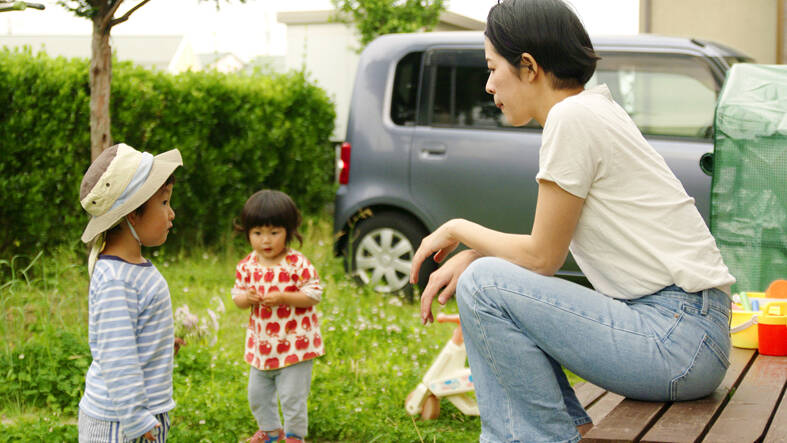The women work hard, sleeping only a few hours a night, as they juggle the demands of caring for their children and doing housework — all while suffering from poverty.
The award-winning independent documentary film The Ones Left Behind, released last year, tells the story of such single mothers in Japan, weaving together interviews with the women and experts, and showing the other side of a culture whose ideal is for women to get married and become stay-at-home housewives and mothers.
“This is a topic that no one wants to really touch. In Japan, it’s very taboo,” Australian filmmaker Rionne McAvoy said Tuesday. “I think it’s a very apt title because I feel that single mothers and their children have really been left behind in society.”

Photo: AP
One woman in the film says she works from 8:30am until 7:30pm, while earning less than 200,000 yen (US$1,350) a month.
Tomiko Nakayama, another woman in the film, says: “I have to do everything on my own.”
Despite being one of the world’s richest nations, Japan has one of the highest rates of child poverty among OECD countries, with one in every seven children living in poverty. About half of single-parent households live below the poverty line.
Japanese society also tends to favor full-time male workers, and women often receive lower wages and fewer benefits, even when they are working full-time and overtime.
Another woman in the film is near tears as she describes how her child stopped asking her about take-your-parent-to-school days. She knew her mom was too busy and couldn’t attend.
McAvoy’s wife, Ayuri, who produced the film, was formerly a single mother. But both deny that’s why Rionne McAvoy made the film. Initially, she wasn’t interested in getting involved in his filmmaking.
What makes the story so “Japanese,” according to Rionne McAvoy, is how the country’s conformist culture makes many women accept their hardships, too ashamed to ask for help, “keeping their public face and private face separate,” he said.
The Ones Left Behind was the Best Documentary Winner at the Miyakojima Charity International Film Festival last year and an official selection at the Yokohama International Film Festival.
Despite repeated promises by the Japanese government to provide monetary assistance to people with children, action has been slow, said Akihiko Kato, a professor at Meiji University who appears in the film.
That’s partly why the birth rate is crashing in Japan from 1.2 million births in the year 2000 to below 700,000 today. Japan also lacks a system that can force fathers to pay child support, according to Kato.
In the past, grandparents, neighbors and other members of the extended family helped look after children. In the modern age of the nuclear family, the single-parent household is often on its own.
What this means for the children is sobering, said Yanfei Zhou, a social science professor at Japan Women’s University who appears in the film. The gap between the haves and have-nots is growing, and the children are destined to inherit the cycle of poverty, she said.
The story of the underclass, including those who are forgotten and don’t have a voice, has long fascinated McAvoy. His next film will be about young people driven to suicide in Japan. He said that being an outsider allows him to tell stories with a fresh perspective and without bias.
“It’s one thing we can do more of in society: to try recognize people’s cries for help,” McAvoy said.

Nov. 11 to Nov. 17 People may call Taipei a “living hell for pedestrians,” but back in the 1960s and 1970s, citizens were even discouraged from crossing major roads on foot. And there weren’t crosswalks or pedestrian signals at busy intersections. A 1978 editorial in the China Times (中國時報) reflected the government’s car-centric attitude: “Pedestrians too often risk their lives to compete with vehicles over road use instead of using an overpass. If they get hit by a car, who can they blame?” Taipei’s car traffic was growing exponentially during the 1960s, and along with it the frequency of accidents. The policy

While Americans face the upcoming second Donald Trump presidency with bright optimism/existential dread in Taiwan there are also varying opinions on what the impact will be here. Regardless of what one thinks of Trump personally and his first administration, US-Taiwan relations blossomed. Relative to the previous Obama administration, arms sales rocketed from US$14 billion during Obama’s eight years to US$18 billion in four years under Trump. High-profile visits by administration officials, bipartisan Congressional delegations, more and higher-level government-to-government direct contacts were all increased under Trump, setting the stage and example for the Biden administration to follow. However, Trump administration secretary

In mid-1949 George Kennan, the famed geopolitical thinker and analyst, wrote a memorandum on US policy towards Taiwan and Penghu, then known as, respectively, Formosa and the Pescadores. In it he argued that Formosa and Pescadores would be lost to the Chine communists in a few years, or even months, because of the deteriorating situation on the islands, defeating the US goal of keeping them out of Communist Chinese hands. Kennan contended that “the only reasonably sure chance of denying Formosa and the Pescadores to the Communists” would be to remove the current Chinese administration, establish a neutral administration and

A “meta” detective series in which a struggling Asian waiter becomes the unlikely hero of a police procedural-style criminal conspiracy, Interior Chinatown satirizes Hollywood’s stereotypical treatment of minorities — while also nodding to the progress the industry has belatedly made. The new show, out on Disney-owned Hulu next Tuesday, is based on the critically adored novel by US author Charles Yu (游朝凱), who is of Taiwanese descent. Yu’s 2020 bestseller delivered a humorous takedown of racism in US society through the adventures of Willis Wu, a Hollywood extra reduced to playing roles like “Background Oriental Male” but who dreams of one day